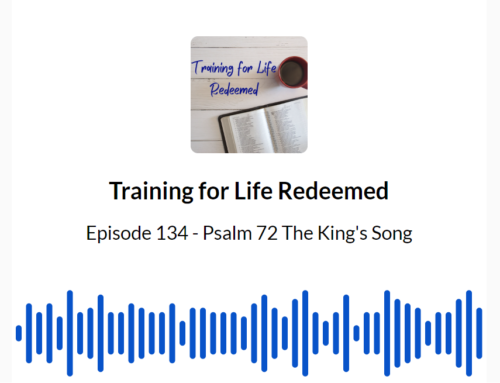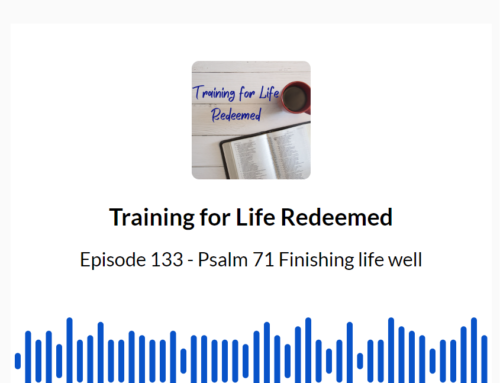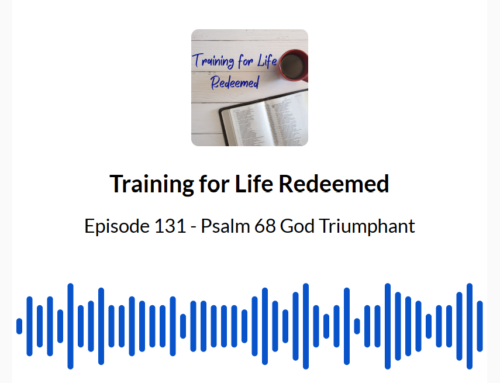It's all about staying on track with Jesus through the craziness of a world gone mad.
We begin a new series on Paul’s First Letter to Timothy as he deals with people who make up their own imaginary reality to replace the reality they find unacceptable.
Get the book: Daily notes on 1 Timothy
Take the challenge to work through Paul’s first letter to Timothy over ten days. The notes will inform, and set you thinking. They are easy to read in under twenty minutes. They include colour photographs and a section for further reflection or discussion. Ideal for those who want to be prepared to read the Bible with first-time readers. At the end there is a section on words and their meaning, as well as who’s who in 1 Timothy.
Grab your notes for this episode by completing the form
and we will send you the link to all our notes.
Transcript
Dan:
Hi, everyone. And welcome to trainingforliferedeemed. I'm your host, Dan Jackson. And as always, I'm here with my father, David Jackson. And today is our first episode in the series that we're going to do on Timothy looking at first Timothy today, we had to do a bit of an introduction and then have a look at first Timothy chapter one, verse one to 17 So Dad, can you just give us a bit of a contextual overview? Where are we up to in the story of the early church when Paul writes the letter to Timothy?
David:Okay, so Paul's done three missionary journeys and , we saw that in o ur series on Acts, he has now gone back to Jerusalem. He's got himself arrested. He had a very exciting journey to Rome, sat there for two years, waiting for his accusers to turn up. We're not sure whether they did or not, but somewhere in there he got released. And as far as we can figure i t out, he went on a couple of more missionary journeys before getting himself rearrested, somewhere around 64 A D . So we're in the period of 62 to 64 AD. And during his third missionary journey, there was all kinds of trouble in Ephesus with false teachers and people coming in causing trouble. So back in Acts 18, he sent Timothy across to try and sort these fellows out. And that was around 58, 59, somewhere around there. Now it's what are we looking at? 62 AD or 63. And he's sending Timothy back to have another go. Okay.
Dan:And then why is it significant? Why's Paul need to send Timothy back? Why couldn't Timothy just go off on his own to go and help fix up the church or pretty much his only job? Why does he need Paul to send him?
David:Paul's doing other things he's got, he's got other churches happening all over the place. He's heading off in a different direction. These fellows that he's trained up on his earlier missionary journeys. And now basically being sent off with Paul , interesting with Paul's authority. So this word, apostle Paul, an apostle is somebody sent with the master's authority. It's like power of attorney. So when Paul opens his mouth, he's speaking on behalf of Jesus. When Paul sends Timothy with that authority, Timothy is speaking both with Paul's authority, and Jesus's authority. And one of the hard things about the pastoral epistles, one, tw o Timothy and Titus, is that you're going to be hearing people, ordering people around. It's not going to be you know sitting having a cup of coffee negotiating. Can I persuade you please? Three bags full, you know, this is just look you in the eye drill Sergeant do, as you're told. And it's that urgent that it carries that sort of language. So Timothy you're commanded to get over there and command those people to get their act together.
Dan:All Right. So one of the big issues that Timothy is going over there to fix, as you mentioned, was this, these false teachers that are hanging around at Ephesus and obviously sharing some things that are not true about the gospel of Jesus or adding things to this. Can you tell us a bit more about these false teachers and just tell us more about it? So
David:What they're up to, well, we remember that back in back in Acts back in about 48 AD they had a big problem because a bunch of fellows came up from Jerusalem. They're arguing. You have to get circumcised to be saved. Uh, it all ends up in a big council in Jerusalem and they say, no, you don't, you're justified by faith. Let's get out there and tell these people, you know, welcome the Gentiles, put your knives away and let's get on with it. This is a whole other group. T here's no mention in this false, this bunch of false teachers of circumcision or anything like that, what we're dealing with is people who are obsessed with Jewish myths. They're obsessed with genealogies and they're after money. there's, there's lots of things about these guys that are a real worry. When we look at the book of Titus Paul's letter to Titus, who was sent out at the same time to go to Creta and s ort out have what looks like the same group of fellows. So there's a movement coming out of Judaism in the diaspora and the spread of Jews around the Eastern middle east. That is saying, you know, we've got a whole bunch of myths here about how it's all going to work out. They've they're saying things about the resurrection, the atonement, and they're saying things that are just not true to put that in perspective. This is 63, 64, AD In 66. AD the Jews revolt against Rome. And they're following false teachers back in Palestine , with all sorts of promises of angels turning up and slashing, Romans out and instituting some Davidic world empire. And the angels don't turn up and everybody gets dead. So you're looking at a million Jews slaughtered by the Roman legions, just, you know, three or four years from this letter. and these, it looks like these false teachers are connected with somehow with all of that, but whatever they're doing, they've got a different way of salvation tha t in volves the law. And this is life and death. If you follow this stuff, you go to he l l. S o Paul's sending Timothy with great urgency to sort this stuff out.
Dan:Okay. And then you mentioned that this letter has that 38 commands in it that are given, which raises the issue around what are we doing in terms of like, there's authority that's very clear in this letter, but then where does autonomy come into this? Like , where do we get that sense of, you know , be able to do what we want, but also at the same time, there's this authority aspect .
David:Yeah. Autonomy. The only person in all the universe who is autonomous is God, everybody else is dependent on God because he's the creator and he is the owner. And so he has the right to order people about and deal with this , what he wants. And that's a very humbling reality. We are not God, we are not autonomous. we are athlete totally dependent that said when God sends us out and holds us accountable for the choices that we make, we've got to remember, we're not making those choices independently of God, God, doesn't sit back and say, oh, well, I wouldn't want to interfere with what you want to do. We are totally accountable to him for every thought, every word, every action. and if we get it wrong, we damage ourselves. We damage other people made in God's image and we destroy his creation, which we're doing a good job of, and that's utterly offensive to God, which is why we call it sin. So we're not autonomous, we're dependent and we're accountable. And in our pride , we're want to stand up and shake our fist at the creator of the universe and say, you can't tell me what to do. And if you read Psalm two , he falls that there's this cartoon image in some two Vern Poydras preached this sermon way back in a chapel service back at Westminster. Seminary preached on Psalm 2 Vern has a way of putting things, but he noted that there are five words in Hebrew for laughter. One starts with a giggle and the strongest term is fall on the floor, rolling around, laughing with your ribs aching . And that's the word that is used in Psalm 2. When the rulers of the earth shake their fist at God, you pictured God rolling around on the floor laughing. Cause it's just so stupid. And Paul is trying to get that message across to people who are making up their own reality. They don't like this one. We'll just imagine something better and we'll live that way and see if we can make reality change. And that's a recipe for getting a fractured skull. And I don't want that brick wall to be there. It doesn't fit my world. And I'm going to prove that I can make it go away. I'm just going to walk, smack straight into it. And then if I, you know, I hurt myself, I'll throw a tantrum because it shouldn't be there because I don't want it to be there. That's as stupid as sin is. And it's as stupid as false teaching is we can't just make up a better gospel or an easier gospel or a nicer God or whatever it is we want to make up. It just doesn't work that way. It's how we make laws in our country. We do that by social consensus, you know, 40 years ago , 40 years ago, killing an unborn baby was murder last year in New South Wales, we changed the law. It isn't anymore. That's autonomy. And to be honest with you, autonomy gets people dead. So Paul is urgent. Yeah . Yeah.
Dan:All right . Now, one thing that we haven't mentioned yet is the connection between Paul and Timothy. So, I mean , we know from Acts that they were doing mission together, but what else, can you talk to us about the relationship between Timothy and Paul? Yeah . He would be more about that. Why would Paul even send him a letter? Yeah,
David:He starts off calling him my true child. Now Paul's a bachelor. He didn't have kids, but he did come across Timothy as a younger man during these missionary travels. Timothy was in the middle of Turkey in a little village. And he , his mother and his grandmother were very pious Jewish people. His father was a Greek and he wasn't interested in keeping the Jewish covenant. So he's coming out of a mixed marriage with a believing mother and an unbelieving father. And I gather from what Paul writes elsewhere, that his mother and his grandmother were very devout ladies. And when Paul came through to that synagogue, they became Christians and so did Timothy. So Paul Timothy was converted under Paul's ministry. He signs up to be a disciple. So that's a full-time Bible student. Uh , it's like going to Bible college. He signs up to study the Bible under Paul and Paul takes him on and trains him up and then takes him with him, match the way Jesus took his disciples as an apprentice minister. And we're now a few years down the track and he's able to send Timothy independently to go and put things right with right doctrine and right practice where people go off the rails. So it's been a real journey for Timothy,
Dan:Thank you so much for your insights into the context around this first letter to Timothy. And we look forward to looking into it in a bit more depth over the next couple of weeks. Now, if you enjoyed this episode, we would love it. If you could subscribe to the podcast and if you really liked it, leave us a review. And if you would like to grab the study notes for this episode, you want to head over to trainingforliferedeemed.com/33. You can access the show notes. The transcript will be there, and also you can download or get access to the study notes for Timothy a daily notes. So we're going to change what they're called our daily notes to , for our first episode on Timothy. So we'll see you again. Next week. When we look at one Timothy chapter one verse 18 through to chapter two, verse 15, and we talk a lot about, you know, where women sit within the church should see .
We are beginning a new series of studies on the Book of Acts.
Jesus is enthroned in glory and so God the Holy Spirit moves in to take up residence in each believer. The Kingdom of God has arrived and is moving as people hear the good news.




